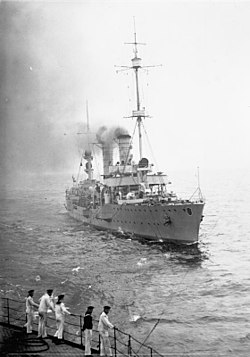 | |
| History | |
|---|---|
| Name | Arcona |
| Namesake | Cape Arkona |
| Builder | AG Weser, Bremen |
| Laid down | 1901 |
| Launched | 22 April 1902 |
| Commissioned | 12 May 1903 |
| Decommissioned | February 1920 |
| History | |
| Recommissioned | 25 May 1921 |
| Decommissioned | 1 December 1923 |
| Stricken | 15 January 1930 |
| History | |
| Recommissioned | As anti-aircraft battery, May 1940 |
| Fate |
|
| General characteristics (As built) | |
| Class & type | Gazelle-class light cruiser |
| Displacement | |
| Length | 105 m (344 ft 6 in) loa |
| Beam | 12.4 m (40 ft 8 in) |
| Draft | 4.99 m (16 ft 4 in) |
| Installed power |
|
| Propulsion |
|
| Speed | 21.5 knots (39.8 km/h; 24.7 mph) |
| Range | 4,400 nmi (8,100 km; 5,100 mi) at 12 kn (22 km/h; 14 mph) |
| Complement |
|
| Armament |
|
| Armor |
|
| General characteristics (1940 configuration) | |
| Armament | |
SMS Arcona was the ninth member of the ten-ship Gazelle class of light cruisers that were built for the German Kaiserliche Marine (Imperial Navy) in the late 1890s and early 1900s. The Gazelle class was the culmination of earlier unprotected cruiser and aviso designs, combining the best aspects of both types in what became the progenitor of all future light cruisers of the Imperial fleet. Built to be able to serve with the main German fleet and as a colonial cruiser, she was armed with a battery of ten 10.5 cm (4.1 in) guns and a top speed of 21.5 knots (39.8 km/h; 24.7 mph). Arcona was a modified version of the basic Gazelle design, with improved armor and additional coal storage for a longer cruising range.
Contents
- Design
- Service history
- Kaiserliche Marine
- Reichsmarine and Kriegsmarine
- Notes
- Footnotes
- Citations
- References
- Further reading
Arcona served in all three German navies over the course of a career that spanned more than forty years. After commissioning in 1903, she served with the fleet's reconnaissance force until early 1907, when she was decommissioned, overhauled, and then sent to the East Asia Squadron. During her deployment abroad, she was involved in the suppression of a revolt against colonial rule in German Samoa in 1909. She was recalled to Germany in 1910 and thereafter modified for use as a minelaying cruiser; during World War I, she operated in this capacity in the mouth of the Ems, while also fulfilling secondary duties. She saw no action during the war.
Following Germany's defeat, Arcona was converted into a mother ship for minesweepers tasked with clearing the minefields that had been laid in the North Sea as mandated by the Treaty of Versailles. After the work was completed in 1920, she was restored to cruiser configuration and she served briefly with the German fleet in the North Sea before being decommissioned in 1923. After spending seven years in reserve, she was used as a barracks ship in the 1930s. In 1940, during World War II, she was converted into a floating anti-aircraft battery and used to defend the port of Wilhelmshaven. She was scuttled by her crew in the final days of the war and was later raised and broken up between 1948 and 1949.



